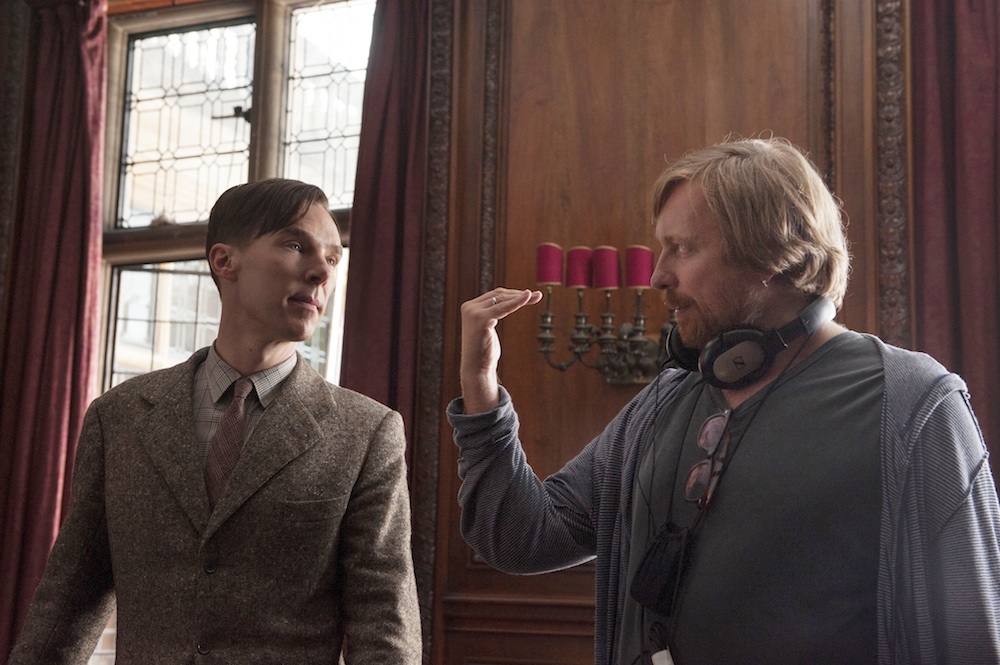Morten Tyldum and Alan Turing’s Sense of Humor

ABOVE: BENEDICT CUMBERBATCH (LEFT) AND MORTEN TYLDUM ON THE SET OF THE IMITATION GAME. PHOTO COURTESY OF THE WEINSTEIN COMPANY.
There are plenty of emotional scenes in The Imitation Game, Morten Tyldum’s biopic of British mathematician and Bletchley Park code-breaker Alan Turing: when a young Turing, miserable and bullied at an all-boys boarding school, loses his only friend and crush to tuberculosis; when Turing’s former fiancé comes to visit him and finds him physically ill from a court-ordered medication that is supposed to repress his homosexuality. It’s the film’s moments of humor, however, that director Tyldum found the most difficult to get right. “The big drama scenes were exhausting, but we all knew what we wanted, we all knew where we had to go,” he explains over the phone from L.A. “[But] how did Alan Turing tell a joke?” he continues. “We did a lot of takes. There’s a tonality thing with the humor that is very complicated. You want the movie to be entertaining, but you don’t want to make fun of Alan Turing. The humor has to come from the character.”
Compared to his cast—which includes Benedict Cumberbatch as Turing and Keira Knightley as his friend-turned-fiancé Joan— Tyldum is relatively unknown in Hollywood. Born and raised in Norway, it was the success of Tyldum’s last film, a dark thriller titled Headhunters, that brought him across the Atlantic. The Imitation Game is keeping him here.
EMMA BROWN: I wanted to start with the basics: how did you first get involved with The Imitation Game?
MORTEN TYLDUM: After Headhunters (2011), [I was sent] a lot of action-thriller scripts, superhero movies—that kind of stuff. Then my agent sent me this beautiful script and I was just blown away by it. That’s what you want: you want projects that you fall in love with. I don’t think you pick your projects; you fall in love with them. It was a lot things; I was amazed at how little I knew about Alan Turing. I always loved history—I always thought I knew history really well—and there was so much that I didn’t know, so I became a little obsessed with him. I’m an outsider in Hollywood and there was something I really loved about a movie that wanted to celebrate individuals who are different—different thinking. [Turing] didn’t really fit in and because of that he was able to have these extraordinary ideas.
BROWN: When you were making Headhunters, did you have any idea that it would be such an international success?
TYLDUM: No, you never have any idea where your movie’s going to go when you’re shooting—you’re in this little bubble. Everything you care about is getting the next step right: getting the script right, finding the right actors, shooting it. Then you spend half a year in a dark room editing your film and you don’t talk to anybody.
BROWN: Do you feel like an outsider in Hollywood because you’re not American? Or is it something else?
TYLDUM: It’s because I’m not an American and also because I’m coming from a different film [background]. Our film society back home is so different from here. Making a movie is universal. Directing a movie is universal; it’s a universal language. It’s just figuring things out and understanding the codes and how the system of Hollywood compares to that of Norway. We don’t even have agents. There’s no studio system, no managers. We’re a more intimate, small system. Coming here and trying to understand Hollywood, it can be challenging when you’ve been working for so many years in a different system.
BROWN: With The Imitation Game, which revolves around a real person, is the primary objective to make an entertaining film or to present this person’s life as accurately as possible?
TYLDUM: There will always be these two concerns, which go side by side. What Turing stood for—to spread his legacy and his ideas—is the most important thing. You can never get this sort of movie 100 percent perfect. It’s impossible, because it happens in two hours time, and you have to compress things and take things that are happening there at the same time and combine them. Filmmaking is about moments. In real life, things might take six months, a year, but [in filmmaking] you have to create the moment where it happened.
BROWN: When you were growing up in Norway, was filmmaking a feasible goal?
TYLDUM: I didn’t know anybody who was a filmmaker—there was no film industry where I grew up. I never knew what a director really did until I was in high school and I started reading up about it. I’ve always loved films, and I always felt like a storyteller. I left Norway after high school and moved to Manhattan and went to film school in Manhattan. That’s when I really found out that this was my calling and what I wanted to do.
BROWN: What was your first trip to Manhattan like? Had you been before you moved?
TYLDUM: I did the whole cliché thing: I had a big bag with all my stuff. I was a huge nerd [and] 19 years old. I didn’t have a place to live and I didn’t know anybody. There was a small Norwegian community there, which was like a Seafarer church, and I had their number. The problem was that I didn’t know you had to press 1-212—the area code—to get it through. I was trying to call them from the airport and I wasn’t able to get a connection with anybody. I had an address, so I just went into a taxi and said, “Take me to this address.” I remember arriving in Manhattan and feeling like I was driving into a movie. [My time in New York] was very formative, very important. I think it shaped me as a human being and as a filmmaker.
BROWN: That sounds absolutely terrifying.
TYLDUM: [laughs] It was terrifying. But sometimes you have to do the things that scare you and that are outside of your comfort zone and challenge yourself.
BROWN: What scares you today?
TYLDUM: Today what scares me is not living up to be a good enough father to my son and letting down my family—not being there enough and not being able to give enough of yourself.
BROWN: How old is your son?
TYLDUM: Six years old.
BROWN: Has he seen any of your films?
TYLDUM: No, he hasn’t. He’s been on film sets a lot. He’s very relaxed around film sets and he understands that I’m a film director in the sense that I make films. But he thinks that I know everybody in the film industry. If he sees something really cool, he asks me, “Daddy, can you ask them to make one for me as well?” Like How to Train Your Dragon 2, he wanted one of those flying suits and I had to explain to him that first of all, it’s an animated feature, those things don’t really exist, and I don’t know everybody. In the middle of all this craziness, it’s very important to take what you’re doing very seriously, and then it’s good to have a six-year-old to remind you what’s really important.
BROWN: What made you return to Norway after film school in Manhattan?
TYLDUM: I had to go back [after my third year] to earn some money. I edited a pilot and I sold some of my third year films to a TV station. I was supposed to go back for my fourth year, [but] they offered me a job to direct a TV series, so I quit school to direct. I’ve been lucky; I haven’t done anything else but direct my whole life. It was good to start back home and make TV series and movies and, now that I’m feeling ready, come here.
BROWN: Do you have any plans to return to Norway?
TYLDUM: Right now, I really like doing American films, and my next project will probably be there. The world is getting so much smaller; where you’re going to live and where you’re going to be, it’s changes rapidly now. Nothing’s being shot here in L.A. —I live in L.A. now with my family—so you’re constantly moving, you’re constantly traveling. It’s like we’re the new gypsies, filmmakers. It’s a very unique and special lifestyle.
BROWN: Do you watch a lot of movies in your spare time?
TYLDUM: Sometimes I think I don’t do anything but make, watch, and talk about films. I just came from the Director’s Roundtable for The Hollywood Reporter with Christopher Nolan, Mike Leigh, Bennett Miller, and Angelina Jolie, and I haven’t seen anybody’s film because I haven’t had the time. It’s been so all-consuming to travel around and talk about The Imitation Game.
THE IMITATION GAME OPENS IN SELECT THEATERS THIS FRIDAY, NOVEMBER 28, AND EXPANDS ON DECEMBER 12 AND DECEMBER 25.






